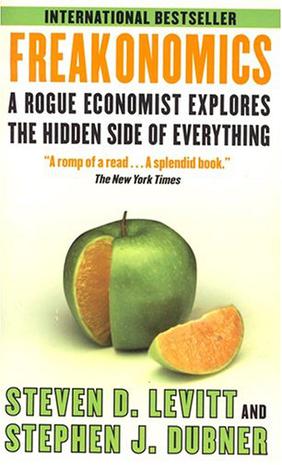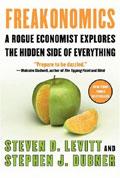欢迎来到相识电子书!
标签:freakonomics
-
Freakonomics(魔鬼经济学)
Book Description Which is more dangerous, a gun or a swimming pool? What do schoolteachers and sumo wrestlers have in coommon? Why do drug dealers still live with their mums? How much do parents really matter? These may not sound like typical questions for an economist to ask. But Steven D. Levitt is not a typical economist. He is a much-heralded scholar who studies the stuff and riddles of everyday life - from cheating and crime to sports and child rearing - and whose conclusions regularly turn the conventional wisdom on its head. He usually begins with a mountain of data and a simple, unasked question. Some of these questions concern life-and-death issues; others have an admittedly freakish quality. Thus the new field of study contained in this book: Freakonomics From Economist The book is a delight... It shows what plain old-fashioned economics can do in the hands of a boundlessly curious and superly skilled practitioner...Ingenious. About Author Steveb D. Levitt teaches economics at the University of Chicago. He recently received the John Bates Clark Medal, awarded every two years to the best American economist under forty. Stephen J. Dubner lives in New York City. He writes for The New York Times and The New Yorker and is the bestselling author of Turbulent Souls and Confessions of a Hero-Worshiper . Book Dimension: length: (cm)17.2 width:(cm)10.5 -
Freakonomics
Economics is not widely considered to be one of the sexier sciences. The annual Nobel Prize winner in that field never receives as much publicity as his or her compatriots in peace, literature, or physics. But if such slights are based on the notion that economics is dull, or that economists are concerned only with finance itself, Steven D. Levitt will change some minds. In Freakonomics (written with Stephen J. Dubner), Levitt argues that many apparent mysteries of everyday life don't need to be so mysterious: they could be illuminated and made even more fascinating by asking the right questions and drawing connections. For example, Levitt traces the drop in violent crime rates to a drop in violent criminals and, digging further, to the Roe v. Wade decision that preempted the existence of some people who would be born to poverty and hardship. Elsewhere, by analyzing data gathered from inner-city Chicago drug-dealing gangs, Levitt outlines a corporate structure much like McDonald's, where the top bosses make great money while scores of underlings make something below minimum wage. And in a section that may alarm or relieve worried parents, Levitt argues that parenting methods don't really matter much and that a backyard swimming pool is much more dangerous than a gun. These enlightening chapters are separated by effusive passages from Dubner's 2003 profile of Levitt in The New York Times Magazine, which led to the book being written. In a book filled with bold logic, such back-patting veers Freakonomics, however briefly, away from what Levitt actually has to say. Although maybe there's a good economic reason for that too, and we're just not getting it yet. --John Moe
热门标签
下载排行榜
- 1 梦的解析:最佳译本
- 2 李鸿章全传
- 3 淡定的智慧
- 4 心理操控术
- 5 哈佛口才课
- 6 俗世奇人
- 7 日瓦戈医生
- 8 笑死你的逻辑学
- 9 历史老师没教过的历史
- 10 1分钟和陌生人成为朋友


